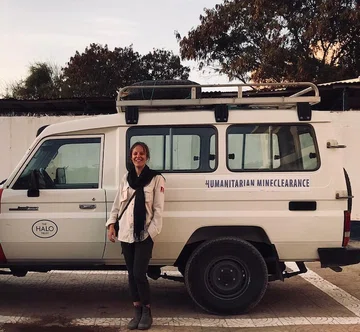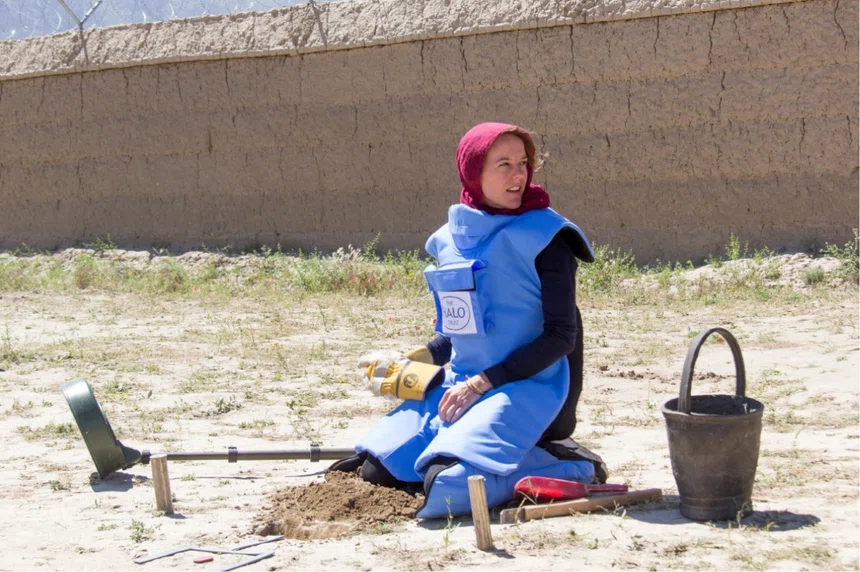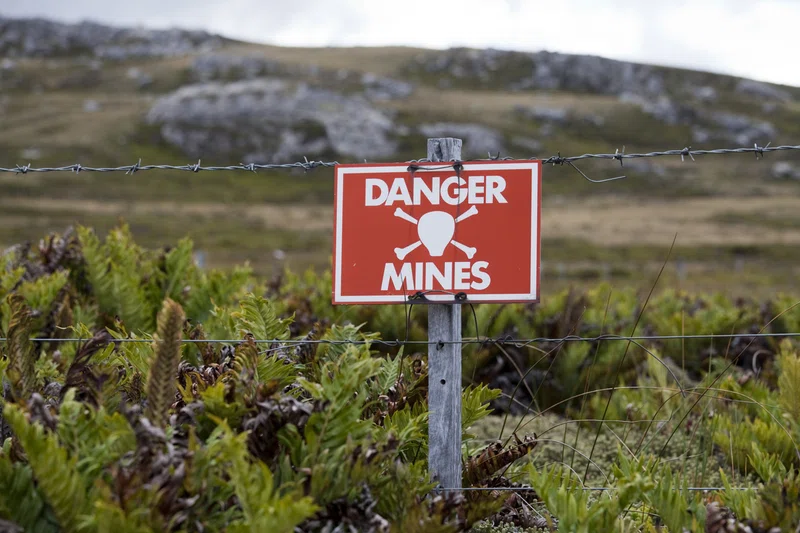
Close
result


Profile
Lucy Reeve
Chief of Staff at The HALO Trust
Alexandra Atkeson,
Lucy Reeve
3 min read


More than ‘the mines people’
More than ‘the mines people’
Why did you get involved with the HALO Trust?
I discovered the HALO Trust when I was studying for my Master’s degree in racial and ethnic conflict and looking to build a career in the humanitarian sphere. It was particularly important for me that I should find an organisation that had a demonstrable and unambiguous impact, rather than generally ‘doing good’. HALO had that: once a landmine is gone, it’s gone forever. But it also goes further than mine removal – HALO is about making land safe so that people return to their communities after conflict, farm their land and build new homes. Our work enables more widespread development too – roads, schools and health centres can be built so that life can really being again.
It clicked. It was exactly what I was looking for. And it also gave me an opportunity for a bit of adventure - time to embed myself in other cultures and work alongside communities, rather than being parachuted into an area of need as a foreigner or outsider.

What sort of training did you receive?
HALO’s selection process assessed my physical and mental resilience – which were then truly tested by six months of tough training in the field. Absolutely everyone in HALO, from the Chief Executive down, starts in the same way: on their hands and knees, learning how to be a de-miner. It is challenging work, both mentally and physically, especially when, like me, you have no relevant experience. Passing the training was one of the proudest moments of my life.
How did your field work experience shape your philosophy today?
There is the personal challenge of working in an austere environment, far from creature comforts, with limited communications and equally limited ways to let off steam or relax. You have to be very disciplined with yourself and find coping mechanisms, even if it’s as simple as planning to take the equipment to make yourself a cup of coffee in the mornings.
Professionally, I was working across languages and cultures in Afghanistan, Cambodia, and Libya. HALO has a localised model, which means that we’re not parachuted in to remove the mines and then leave, but train local people to do the job themselves. So we’re working often through translators, communicating extremely robust safeguarding messages to people in communities that can be traumatized after conflict. I learnt the importance of being present; even if you can’t speak the language, you have to be there and you have to be seen to be there, supporting the de-miners.
Finally, you have to learn patience. Organisations such as HALO often attract dynamic people, who want to move fast and have an immediate impact. But building relationships takes time, especially with a large number of ever-changing stakeholders.

Communication is at the heart of the role of chief of staff. What are the particular challenges with the HALO Trust?
Internally, you need to make sure that information is shared widely – no easy feat when you’re communicating to over 12,000 staff in the field and across time zones. Externally, it’s important that people understand the breadth of activities that we’re involved in. HALO works in some of the most climate and conflict affected regions in the world, where war and environmental degradation compound the suffering of vulnerable communities. Clearing landmines has been our core purpose since HALO was first established, but we do a great deal more besides, to help support recovery and build resilient communities. In Angola, for instance, we are clearing landmines in the Okavango Headwaters as part of a major conservation project to restore biodiversity and allow wildlife to return. In Somaliland, we are partnering to help communities return cleared land to productive use with a range of initiatives from rainwater capture to tree planting. Emergency response is another element of our work because we are operating in many of the world’s most fragile countries. This means we can act quickly when disaster strikes. For instance, when the earthquake shook Afghanistan in 2022, we deployed our teams within hours to support the injured and make access routes safe, so emergency aid could get through. Increasingly, HALO is operating at the nexus of conflict, stabilisation and climate emergency.

Author Bio
Lucy Reeve
Chief of Staff at The HALO Trust
Lucy joined HALO in 2017 and completed demining training in Cambodia, Somaliland and Georgia. She was then posted to Afghanistan, Cambodia and most recently Libya, overseeing the delivery of projects including mine clearance, weapons and ammunition management and IED clearance. In 2021 she took up the position of Chief of Staff in 2021. Before joining HALO, Lucy worked in sustainable travel and international development. She holds a BA Hons in Chinese, an MPhil in Racial and Ethnic Conflict and holds IMAS EOD Level 3 and IEDD Level 2 qualifications.

Author Bio
Alexandra Atkeson
Alexandra Atkeson is an incoming Social Anthropology Master's student at the University of Oxford. Prior to this, she was a Product Manager and Assistant Journal Editor at The Chief of Staff Association. Alexandra graduated from the University of St Andrews in 2022 with a joint honours degree in International Relations and Social Anthropology.








